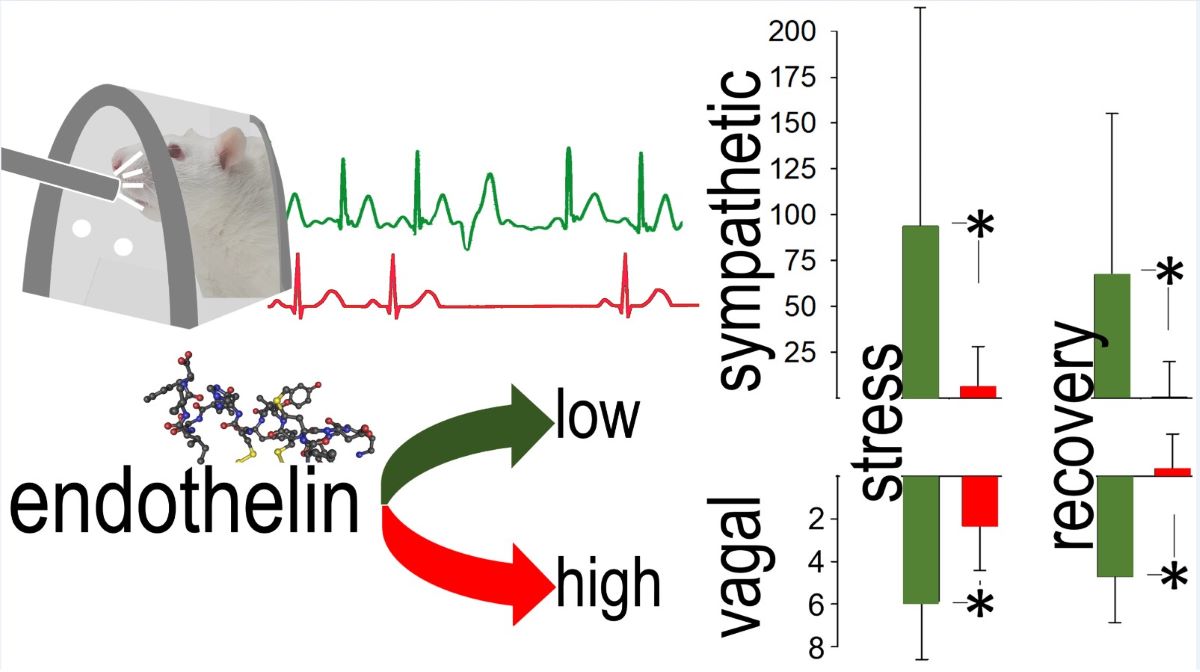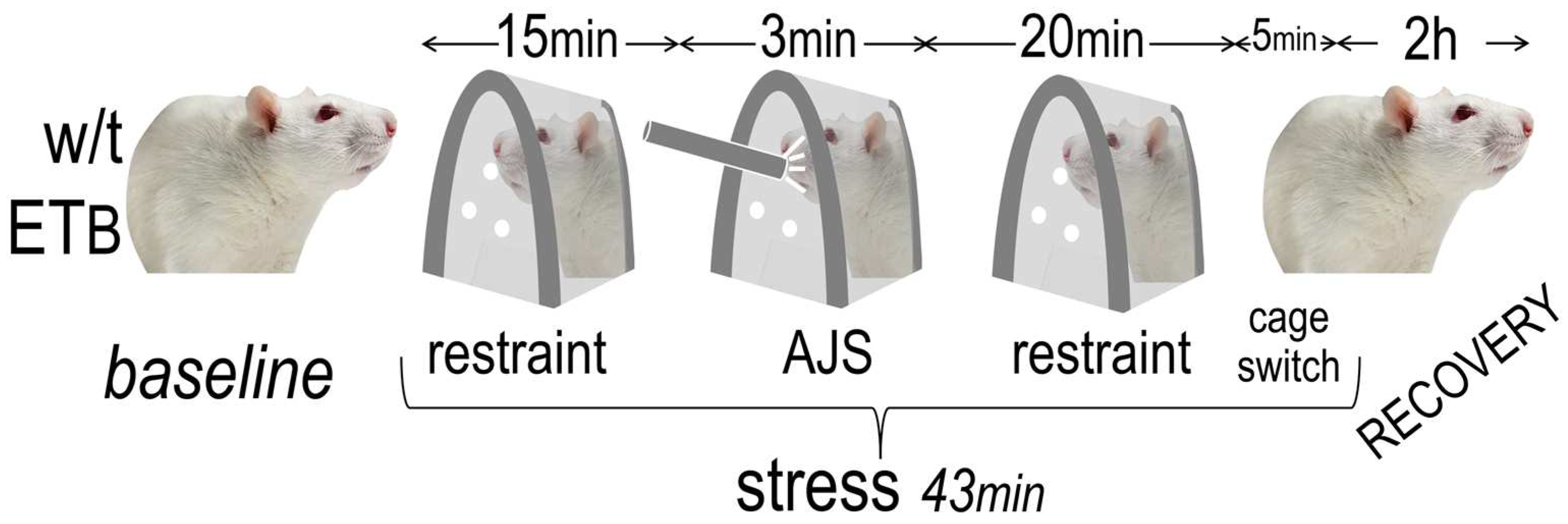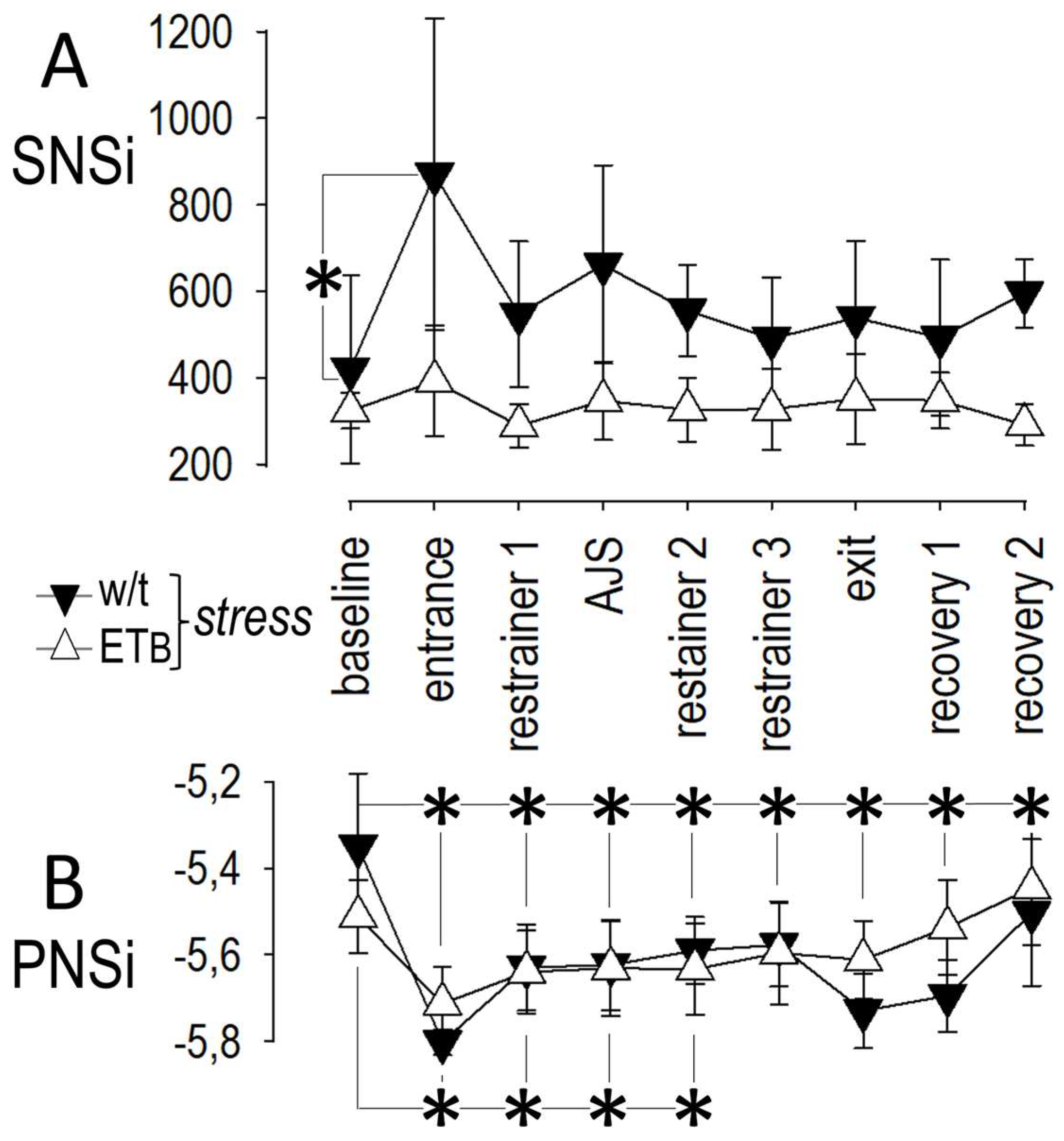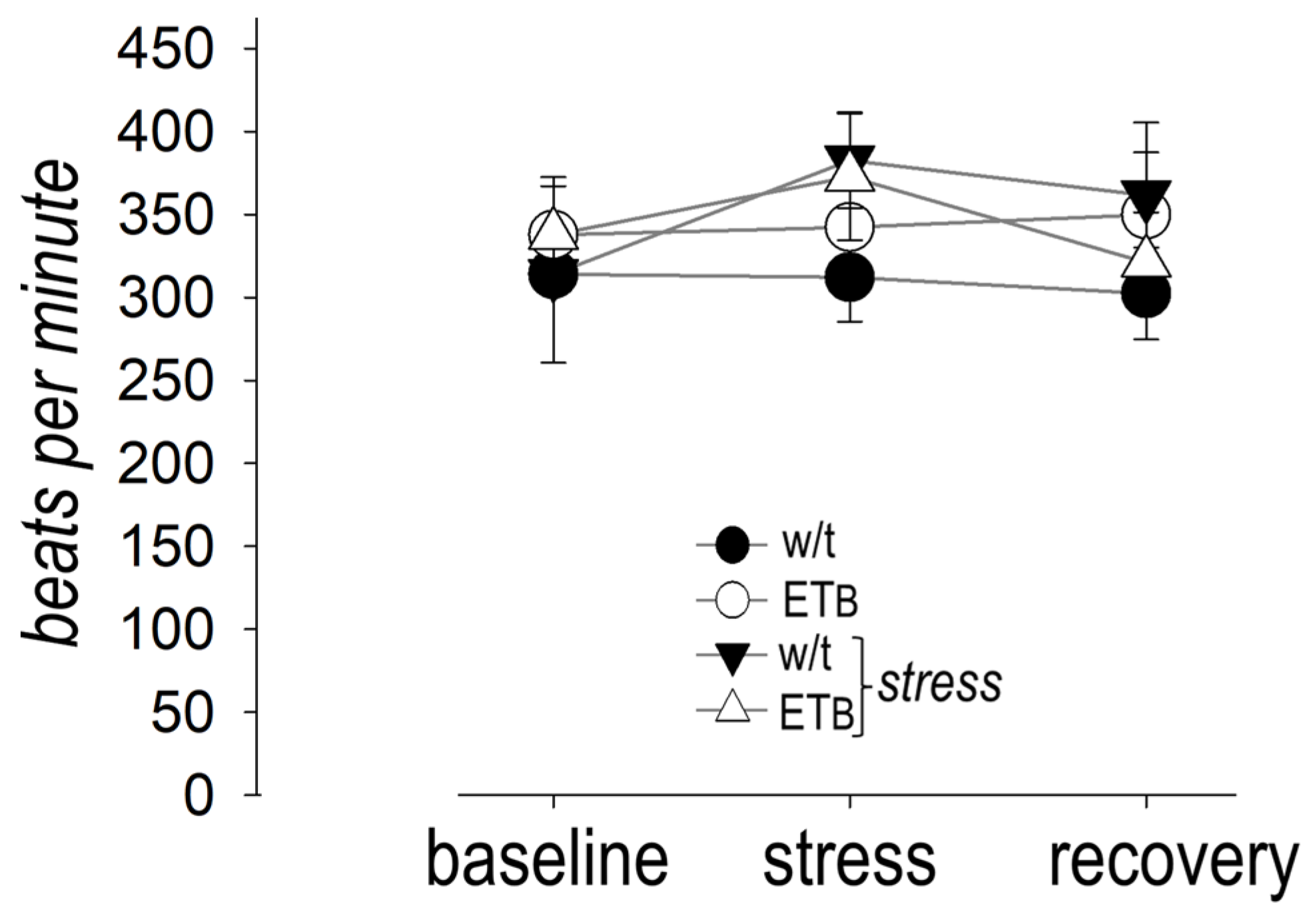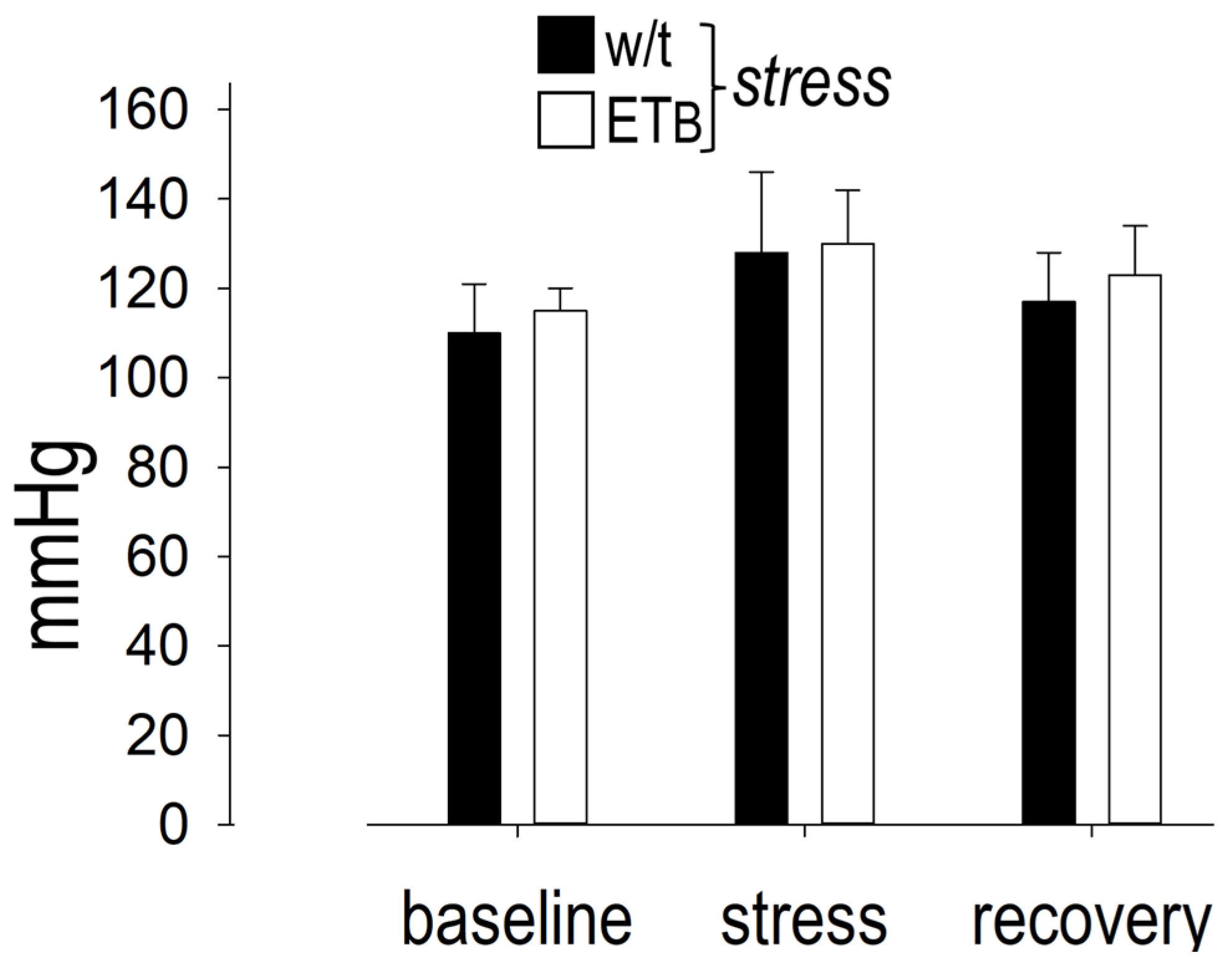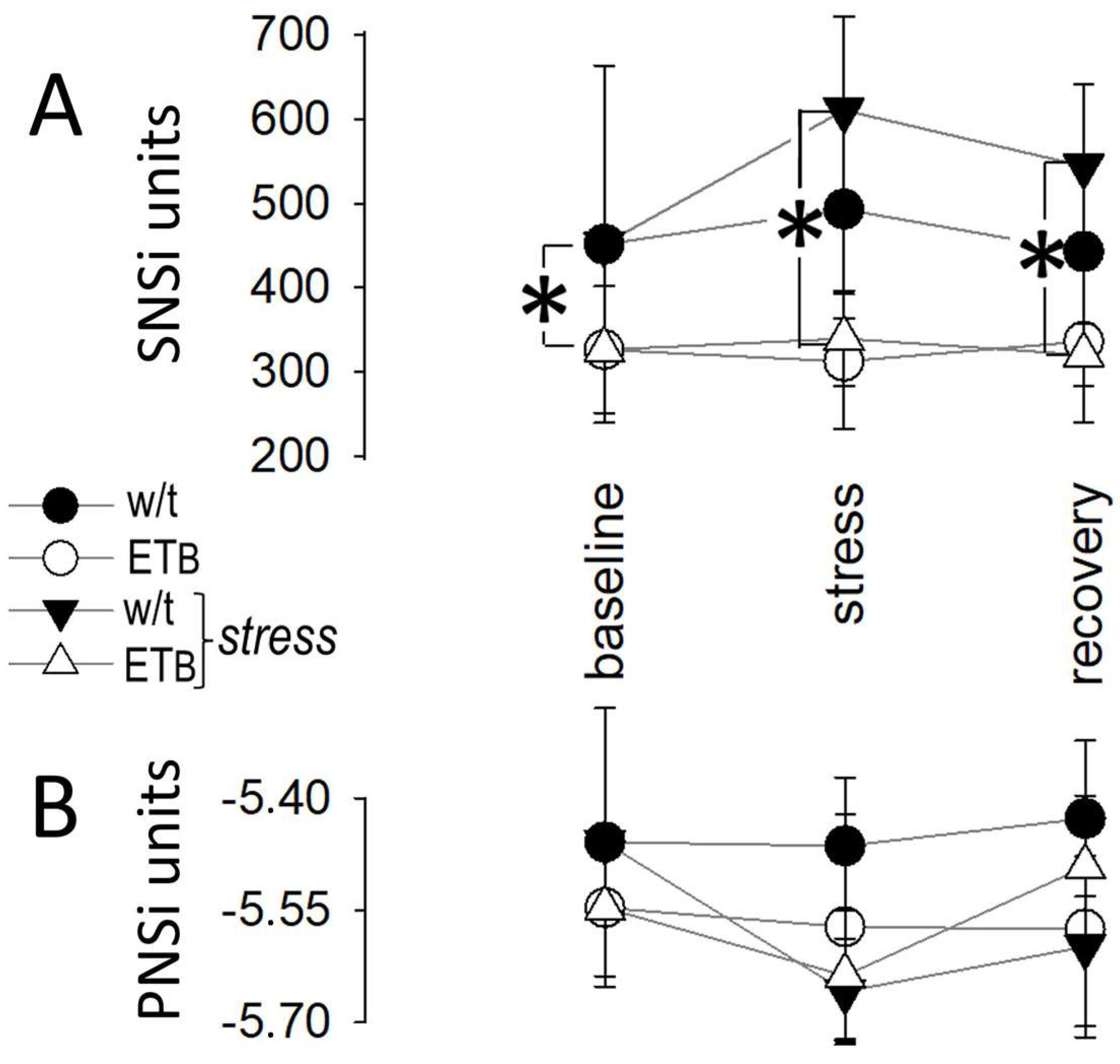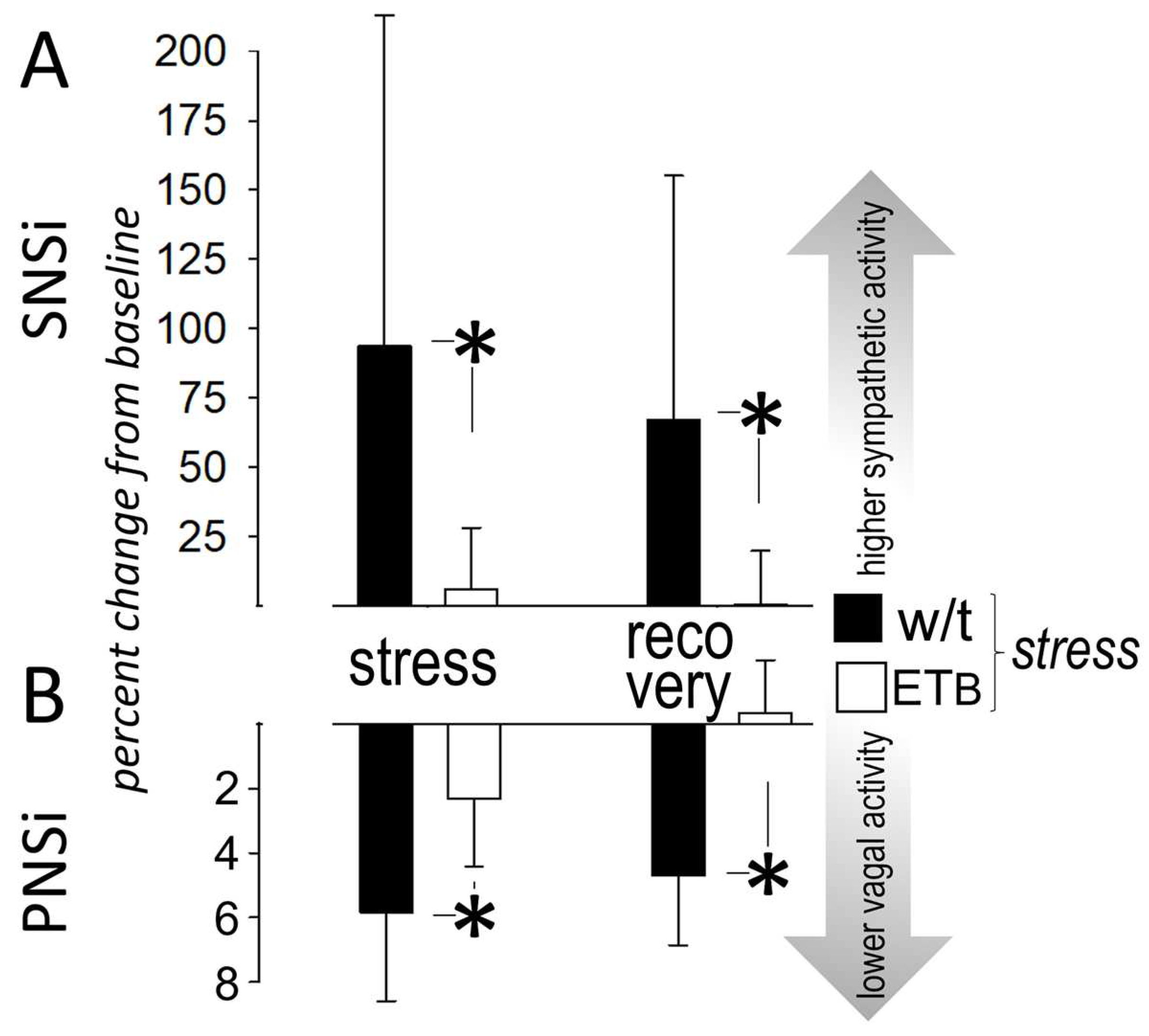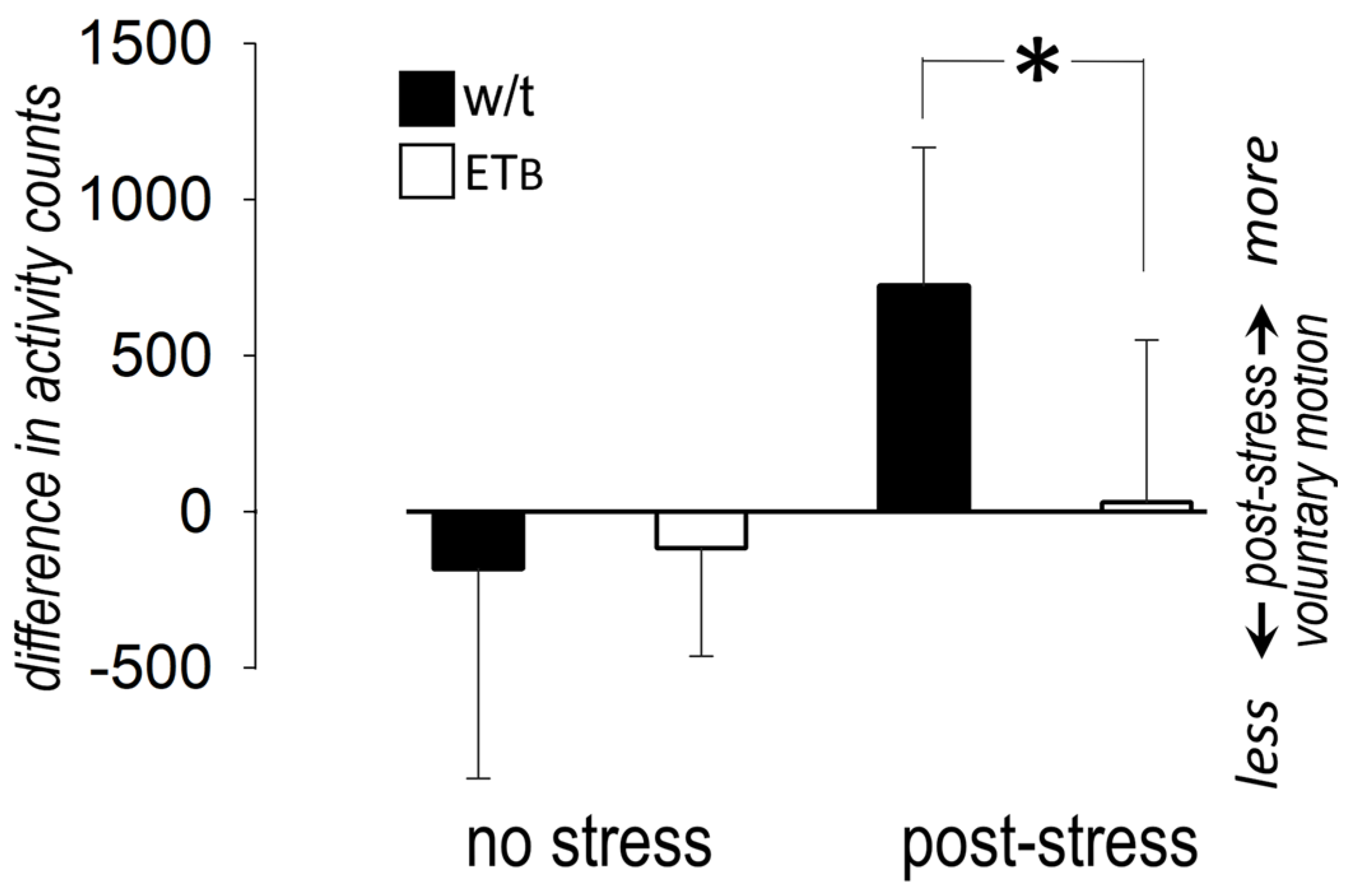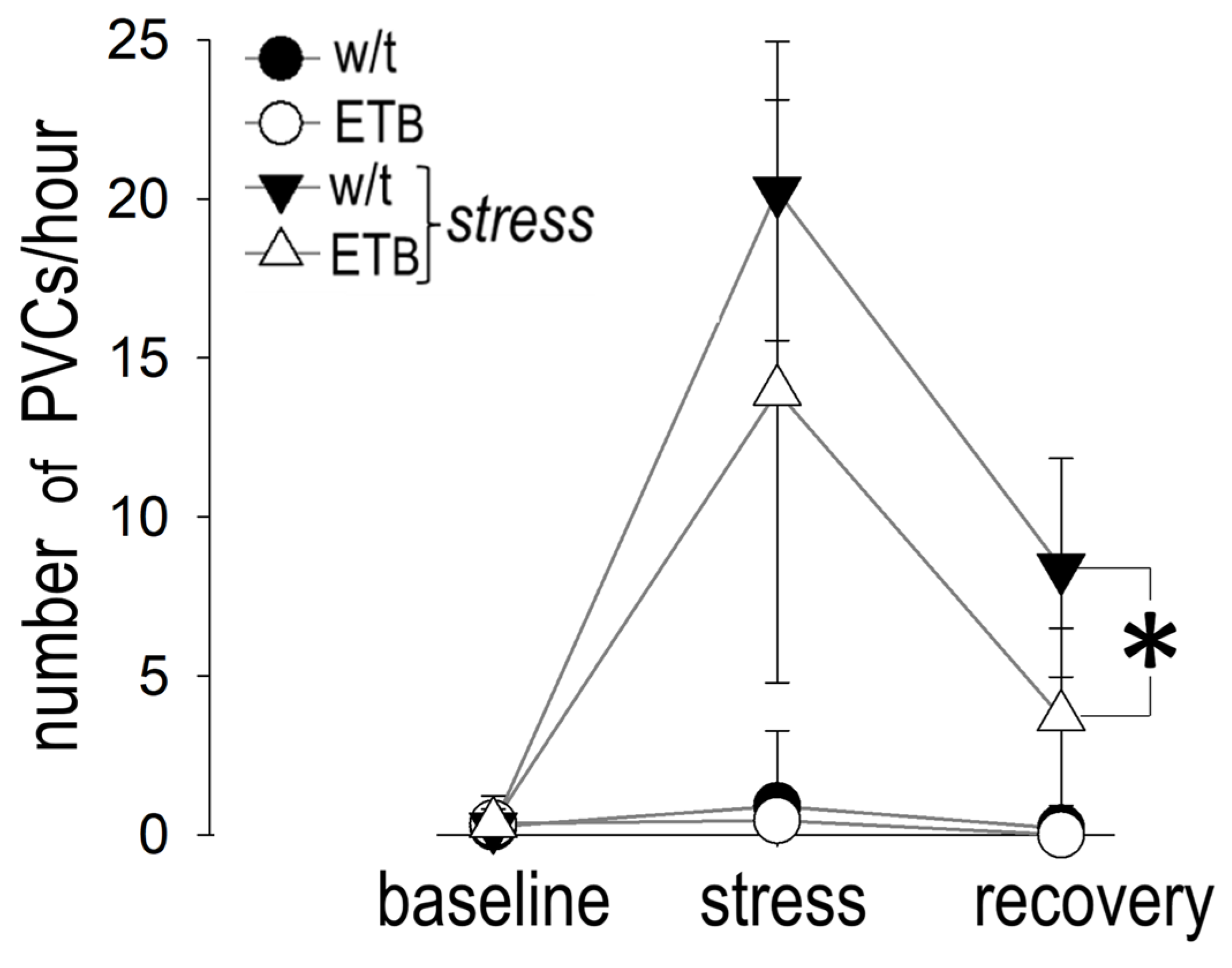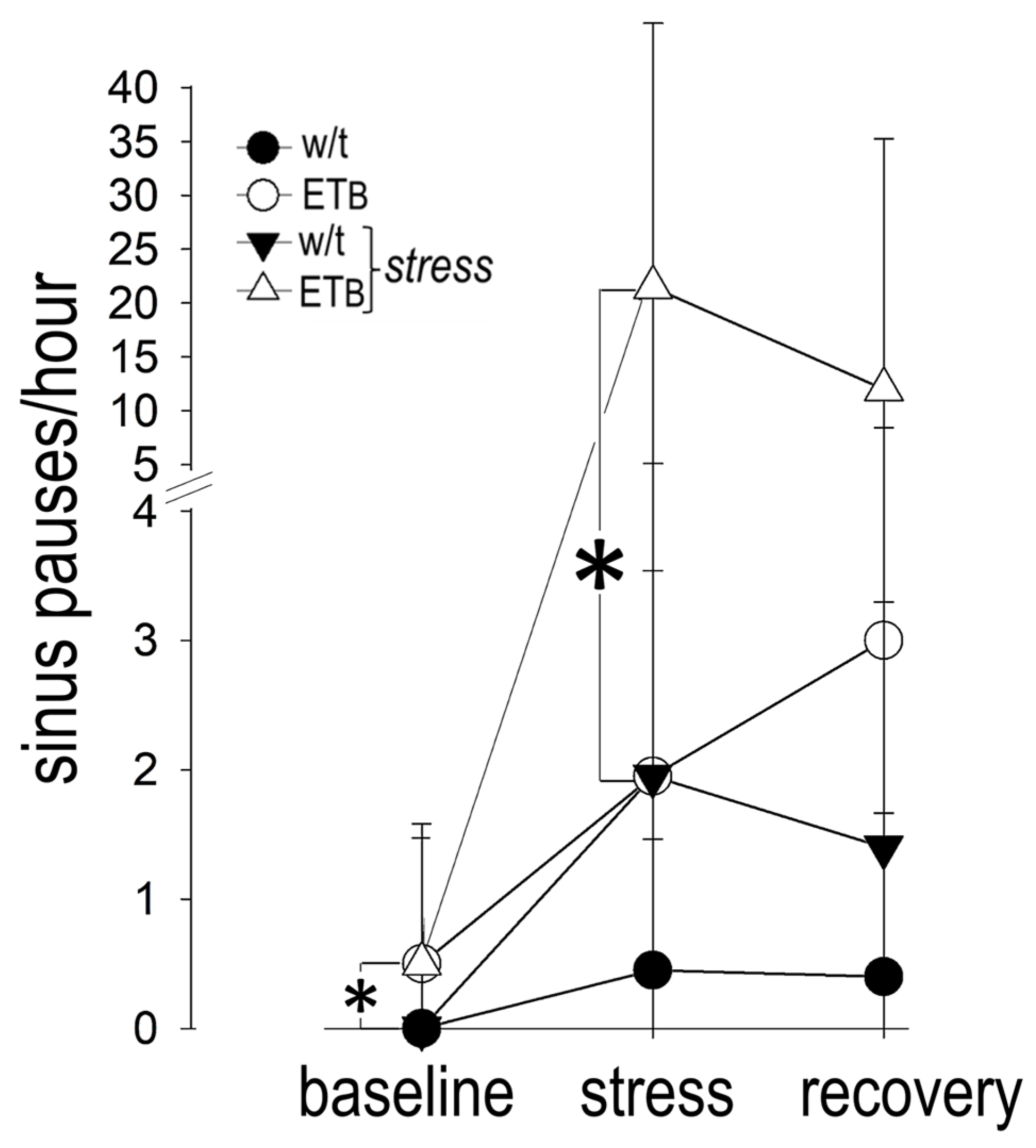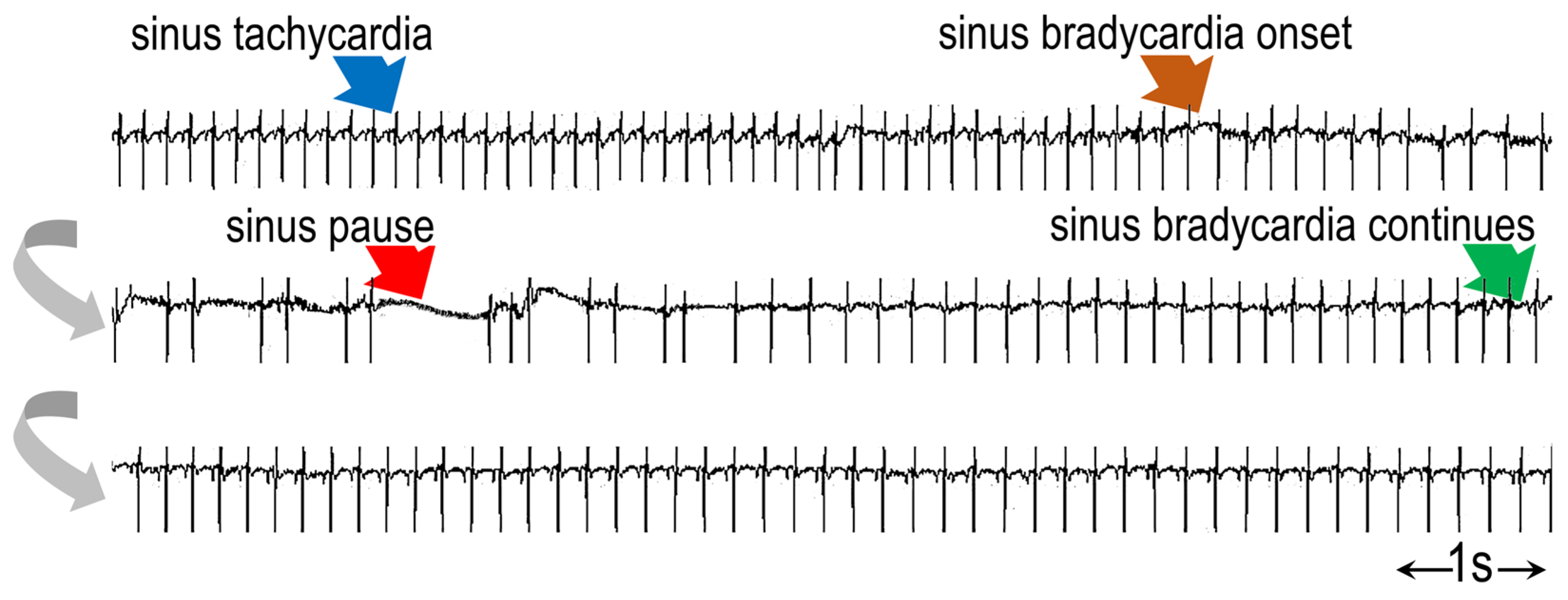1. Introduction
Acute emotional stress (AES) is defined as an actual or anticipated threat to well-being. The responsive mechanisms to unpredictable stressor effects were recognized by Walter Cannon over a century ago but remain subject of continuing research. Aiming at maintaining homeostasis, physiologic adaptations to AES display distinct features from those elicited during physical exertion [
1]. Under conditions of AES, the autonomic nervous system provides immediate reactions, altering the physiologic state of many organs. These responses are sustained by activation of the hypothalamic-pituitary-adrenocortical axis, leading to elevated circulating glucocorticoids and catecholamines.
The heart is highly innervated by sympathetic and vagal fibers that continuously control its performance. Acting on the sinus node, the atrioventricular mode and the ventricular myocardium, autonomic activity modulates cardiac output to meet the demands associated with the state of ‘fight or flight’. However, excessive sympathetic activity enhances automaticity and alters ventricular repolarization, thereby creating an arrhythmogenic milieu in the ventricular myocardium; on the other hand, excessive vagal activity triggers bradycardia that can lead to syncope [
2].
Anecdotal link between strong emotions causing death can be traced as far back as the existence of written records, from ancient Greek history to the Bible and later to the vivid narratives found in Shakespeare’s work [
3]. Following Cannon’s description of cases from anthropology literature [
4], one of the earliest scientific approaches entailed a case-series of 170 sudden deaths attributed to strong emotions [
5]. Firm epidemiologic evidence was provided by the demonstration of a sharp rise in the incidence of sudden cardiac death during the days following a major earthquake in Athens, Greece in 1981 [
6] and subsequently in Newcastle, Australia in 1989 [
7] and in Los Angeles, USA in 1994 [
8].
A large body of evidence now indicates that AES elicits autonomic responses that can induce rhythm disturbances, even in apparently healthy myocardium. Following early experimental observations in dogs [
9], more recent approaches using heart rate variability (HRV) analysis, derived from continuous telemetrically recorded electrocardiograms (ECG) in conscious rats [
10], demonstrated complex ventricular tachyarrhythmias elicited by marked shifts in autonomic balance. The link between emotions and arrhythmogenesis was strengthened by a case-series of patients with implanted defibrillators, often reporting anger [
11] or fright [
12] preceding episodes of ventricular tachyarrhythmias, which were promptly terminated by the device. Fueled by such profound clinical impact, major research efforts have focused on the investigation of the factors that regulate autonomic activity after AES.
Endothelin (ET)-1 is a ubiquitous 21-amino acid peptide involved in many biological processes, including the modulation of autonomic activity during various pathophysiologic conditions [
13]. Experimental data from several groups [
14,
15], including ours [
16], have demonstrated a complex interplay between the endothelin system and sympathetic activation, which is operative in the adrenal medulla [
17], the myocardium [
18,
19,
20] and the brain [
21,
22]. High ET-1 levels and blood pressure (BP) were found in rats exposed to pulsatile air-jet stress [
23], with vascular endothelium identified as a potential source of ET-1 [
24], mediated by corticotropin-releasing hormone [
25]. In addition to its vascular actions, a growing body of evidence suggests that ET-1 has potent actions in the brain, likely acting as a neurotransmitter at several loci [
26]. Along these lines, ET-1 is thought to participate in AES responses, based on high expression found in the hypothalamus, the limbic system, and the amygdala [
27].
Studies in humans have further supported the link between ET-1 and AES, particularly in patient cohorts with chronically elevated ET-1 levels [
28,
29,
30]. A study examining spectators of a sports game reported higher plasma ET-1 levels during excitement in patients with history of coronary artery disease, accompanied by enhanced sympathetic responses [
28]. Furthermore, a small-scale clinical study in patients with atherosclerotic peripheral vascular disease found excessive plasma ET-1 levels after mental stress [
29]. Importantly, high endothelin levels have been also associated with vagal dominance in neurocardiogenic syncope, characterized by bradycardia, which is commonly observed after AES [
30].
The aim of the present work was to further investigate the pathophysiologic role of ET-1, utilizing an established AES protocol in conscious rats [
31]. The working hypothesis was that autonomic activity and arrhythmogenesis after AES may vary, depending on baseline plasma ET-1 levels. As HR and BP responses provide only an estimate of autonomic balance, we additionally evaluated sympathetic and vagal activity separately using HRV analysis. Two rat-strains were compared, namely wild-type Wistar and the previously described Wistar-Imamichi stain [
32], carrying a natural deletion in the gene encoding for the endothelin-B (ET
B) receptor; this strain (breaded in our laboratory after generously provided by Prof. M. Yanagisawa, University of Tsukuba, Japan) has been rescued by directed ET
B transgene-expression to support normal enteric nervous system development [
32]. As the ET
B-receptor plays an important role in the clearance of ET-1, homozygous ET
B-deficient rats have 10-fold higher plasma ET-1 levels [
33]. Our comparison included temporal changes in autonomic indices and rhythm disturbances over a prolonged observation period encompassing AES and recovery.
2. Materials and Methods
2.1. Animal study population and Ethics
The experiments were conducted on (a total of)
n=56 rats, of which
n=28 (19±1 weeks of age, 405±47g) were wild-type Wistar, and
n=28 (20±1 weeks of age, 367±71g) were ET
B-deficient Wistar-Imamichi. AES was induced in
n=10 rats from each strain, along with a sham procedure in equinumerous animals; in addition,
n=8 rats were used from each strain in the BP protocol (see below). To overcome the confounding effects of gender, we included only male rats, given the previously reported gender-related differences in HR responses to AES [
34]. Measurements obtained from all animals were used for the analyses, without exclusions.
The animals were housed in singles in standard Plexiglas cages, under optimal environmental conditions in terms of temperature (20℃-22℃), humidity (70%), and light/dark cycles (12/12 hours). Tap water and standard rodent chow were provided ad libitum. All procedures were in accordance with the ARRIVE guidelines [
35] and European legislation (2010/63/EU), and the study protocol was approved by the regulatory authorities (Regional Municipality of Attica, approval number: 574219).
2.2. Study design
We compared changes over time in HR, voluntary activity, autonomic variables, brady- and tachyarrhythmias between four groups, namely wild-type and ET
B-deficient rats, in the presence or absence of AES. Time points were taken at baseline, during and after AES or a sham procedure. This part of the study included 40 rats, in which miniature ECG transmitters (TCA-F40, Transoma, New Brighton, MN, USA) were implanted as previously described [
36]; care was taken to avoid motion artifacts by securing both leads to the surrounding tissues. All implantations were performed a minimum of five days prior to the main experiments, allowing recovery from the procedure. The cages containing rats with implanted transmitters were placed on top of telemetry receivers (RCA-1020, Transoma), through which the ECG signal was continuously recorded by the acquisition software (ART, Transoma).
2.3. Induction of AES
All experiments were performed during morning hours in a quiet room, under plenty of natural light. We used an established protocol of unpredictable AES, which combines restraint [
37] and air-jet stress [
38], after slight modifications; the total duration was 43 minutes, followed by a two-hour recovery period (
Figure 1). This protocol is reliably reproduced in the laboratory, resulting in consistent neuroendocrine and cardiovascular responses [
39]. Recent validation of this protocol by our group showed prominent autonomic responses, involving both arms [
31]. In the sham protocol, the animals remained in their cage and were observed from (a distance of) one meter for the same length of time.
The following five-minute intervals were analyzed: baseline, restraint onset, restrainer-1 (12min following the onset of the previous period), air-jet (consisting of 18 air-pulses, each of 2s duration, given at 8s intervals via air pump at 10L/min), restrainer-2 (immediately after the termination of the previous period), restrainer-3 (the last five minutes in the restrainer) and exit (the first five minutes in the cage). We included the latter in the period of AES, as it encompasses cage-switch, an established aversive stimulus [
40], as reiterated by our recent experience [
31]. Findings from the six periods of AES are reported either separately or as their average. In addition, two five-minute periods of recovery were analyzed, namely recovery-1 (commencing five minutes after return to the cage) and recovery-2 (the last five minutes of recovery), reported either separately or as their average.
2.4. Heart rate variability analysis
HRV analysis was performed from consecutive sinus inter-beat intervals, with the widely used, previously validated [
41] Kubios software (University of Eastern Finland, Kuopio, Finland). In addition to time- and frequency-domain analysis, the software calculates the sympathetic nervous system index (SNSi) and the parasympathetic (vagal) nervous system index (PNSi), by combining several variables; hence, more accurate description of each arm is provided, especially regarding swift changes from steady-state values [
41]. The SNSi was computed from three variables, namely (a) mean HR, (b) Baevsky’s stress index, and (c) the length of distribution of Poincaré plots after nonlinear analysis. The PNSi was computed also from three variables, namely (a) the mean inter-beat interval, (b) the root mean square of successive differences between inter-beat intervals in time-domain analysis, and (c) the width of distribution of Poincaré plots. Individual variability in SNSi and PNSi responses was accounted for by their expression as percent change from baseline values.
2.5. Arrhythmia analysis
All stored ECG tracings were analyzed off-line independently by four operators (E-T. M., T. K., A. L., and Z. K.), blinded to group identity. Current guides were followed [
42], defining premature ventricular contractions (PVCs) as single wide-complex electrical depolarizations interrupting the sinus inter-beat interval; couplets (two consecutive PVCs) and triplets (three consecutive PVCs) were counted accordingly. The number and duration of bradyarrhythmic events were also recorded, including episodes of sinus pause and atrio-ventricular block (AV); specifically, sinus pauses were defined as intermittent absence of atrial and ventricular depolarization, whereas AV block was identified as failing impulse conduction from the atria to the ventricles [
43]. The duration of each episode was determined using the graded scale provided by the software.
2.6. Voluntary activity
Voluntary activity was recorded with the use of the analysis software (ART, Transoma) at baseline and during the two-hour recovery period. Voluntary activity was depicted as motion counts, totaling the number of changes in animal location within the cage. To account for individual variability, we report the difference between recovery and baseline counts. This variable provides a measure of continuing anxiety and is used as a marker of post-AES adaptation [
44].
2.7. Blood pressure protocol
Systolic BP was recorded noninvasively using the tail-cuff method (IN125/R, ADInstruments, Oxford, UK), as previously described [
45]. Because of the restraint required in this method, baseline BP was obtained after acclimatization and prolonged (30min) stay in the restrainer, as the average of ten successive measurements at the end of this timeframe; subsequently, pulses of air-jet were delivered for 3min, during which two BP measurements were obtained, followed by ten further measurements during the 15min recovery period [
46]. The respective averages were reported as ‘stress’ and ‘recovery’ periods.
2.8. Statistical analysis
Values are reported as mean ± one standard deviation. Baseline variables in both rat-strains and voluntary activity post-AES were compared with t-test. Changes over time were assessed with the use of (two-way) analysis of variance for repeated measures, with rat-strain and time as between- and within-groups factors, respectively. Baseline values of all variables in both ET
B groups and both control groups are presented as the respective average. Differences (between- and within-groups) at each prespecified time-period were evaluated with the use of post-hoc Tukey’s HSD test. Variables describing brady- and tachyarrhythmias were not normally distributed, according to the (Lilliefors corrected) Kolomogorov-Smirnov test [
47] and were compared with non-parametric tests, namely Mann-Whitney U-test or Kruskal-Wallis analysis of variance, as appropriate. Statistical significance set at an alpha level of 0.05.
3. Results
3.1. Baseline differences between the two rat-strains
Table 1 demonstrates the baseline characteristics in wild-type and ET
B-deficient rats.
Voluntary activity and HR were comparable between groups, as were time-domain HRV variables. By contrast, the ratio of low- (LF) to high-frequency (HF) spectra in the frequency-domain analysis, depicting steady-state autonomic balance, indicated vagal dominance in ETB-deficient rats. This finding reflected differences in both autonomic arms, as shown by lower LF and higher HF values, showing lower sympathetic and higher vagal activity, respectively. Lower sympathetic activity in ETB-deficient rats was corroborated by lower SNSi, whereas the difference in the vagal index PNSi was of marginal statistical significance. Differences in PVCs or tachyarrhythmias were absent at baseline. However, occasional bradyarrhythmic episodes in the form of sinus pauses were recorded in ETB-deficient, but not in wild-type rats. No AV conduction disturbances were present.
3.2. Autonomic responses in wild-type rats
Compared to baseline, SNSi increased sharply from baseline in wild-type rats at the onset of AES, with subsequent decline during the remaining period of AES and during recovery (
Figure 2A).
Compared to SNSi, changes in PNSi were more prolonged in this rat-strain; specifically, PNSi decreased from baseline at the onset of AES and remained low during the period of AES and during recovery (
Figure 2B).
3.3. Autonomic responses in ETB-deficient rats
Contrasting the response observed in wild-type rats, SNSi remained unchanged from baseline during AES and during recovery in ET
B-deficient rats (
Figure 2A). As in wild-type rats, more prolonged PNSi changes were observed in ET
B-deficient rats; however, PNSi returned to baseline values earlier, i.e., at the end of AES and prior to the onset of recovery (
Figure 2B).
3.4. Between-groups comparison: Heart rate
In the absence of AES, HR remained stable. HR increased during AES and remained high during recovery in wild-type rats. Likewise, HR increased during AES in ET
B-deficient rats, but returned to baseline values during the recovery period. Despite this finding, HR during either AES or recovery did not differ significantly between the two rat-strains (
Figure 3).
3.5. Between-groups comparison: blood pressure
Systolic BP displayed significant differences during AES and recovery in each group, without differences between them (
Figure 4). In detail, systolic BP (expressed in mmHg) rose from 110±11 (baseline) to 128±18 during AES and returned to baseline values (117±11) during recovery in wild-type rats. Likewise, systolic BP rose from 115±5 (baseline) to 130±12 during AES and returned to baseline values (123±11) during recovery in ET
B-deficient rats. The observed differences between the two rat-strains failed to reach statistical significance.
3.6. Between-groups comparison: sympathetic activity
In the absence of AES, sympathetic activity remained stable during the entire observational period in both rat-strains, whereas significant differences were observed during AES (
Figure 5A). Specifically, sympathetic activation, expressed as SNSi, was markedly higher in wild-type rats than in ET
B-deficient rats during AES, with this difference persisting during recovery. The higher sympathetic response in wild-type rats was confirmed when SNSi was expressed as percent change from baseline, with major differences observed during AES and during recovery (
Figure 6A).
3.7. Between-groups comparison: vagal activity
In the absence of AES, vagal activity remained stable during the entire observation period in both groups. During AES, PNSi decreased in both groups, without differences between them (
Figure 5B). Despite the more prolonged vagal responses during recovery in wild-type rats (described above,
Figure 2B), PNSi did not differ between groups during this timeframe. Importantly, however, PNSi percent changes from baseline were more pronounced in wild-type than in ET
B-deficient rats during AES and during recovery (
Figure 6B).
3.8. Between-groups comparison: voluntary motion
In the absence of AES, voluntary motion remained stable during the observational period in both groups. AES had no effect on voluntary motion during recovery in ET
B-deficient rats, but the difference in activity counts indicated higher motion in wild-type rats (
Figure 7).
3.9. Between-groups comparison: premature ventricular contractions
Figure 8 depicts the number of PVCs per hour at baseline, during AES and during recovery.
During AES, there was a statistical trend (p=0.064), but not significance, towards more frequent PVCs in wild-type rats, when compared to ETB-deficient rats. Of note, this difference became significant during the recovery period.
3.10. Comparison between groups: Bradyarrhythmias
Figure 9 depicts the number of sinus pauses during the three observation periods.
Sinus pauses were more frequent during AES in ET
B-deficient rats, as compared to wild-type rats. Although sinus pauses were observed in ET
B-deficient rats during recovery as well, their number per hour was not significantly different from that observed in wild-type rats. Only scarce episodes of AV-block were observed during AES or recovery in both groups, without differences between them. An example of sinus pause is shown in
Figure 10.
4. Discussion
Our experiments demonstrate sympathetic activation and vagal withdrawal in response to AES in wild-type rats. As a result, rises in HR and BP at the range of 20-30% were recorded, which are comparable to those reported in a similar protocol [
48]. By contrast, autonomic responses were blunted in ET
B-deficient rats, especially regarding the sympathetic arm. The markedly different patterns of autonomic activity did not yield differences in HR and BP, but voluntary activity during recovery was higher in wild-type rats, reflecting continuing anxiety in this strain. Moreover, the blunted sympathetic response in ET
B-deficient rats was accompanied by frequent bradyarrhythmias during AES and recovery, as opposed to frequent PVCs in wild-type rats.
4.1. Autonomic responses in wild-type rats
Despite the widespread use of the rat-model of AES, detailed evaluation of sympathetic and vagal responses is scarce. Analyzing time-domain parameters of HRV, Sgoifo et al [
10] described higher sympathetic activation with simultaneous vagal withdrawal during a 15min recording period after social stress in rats, a model relevant to depressive and anxiety disorders. Together with our initial experience [
31], our current HRV analysis provides an important addition to the characterization of the present AES-protocol, which is considered more relevant to emotions of fear [
49]. Additionally, the evolvement of HRV analysis (by combining several variables derived from frequency-domain and nonlinear analysis), as used here, provides a more accurate description of autonomic changes over short periods of time [
41].
In our experiments, we observed rapid sympathetic activation at the onset of AES in wild-type rats, with a subsequent plateau at lower values until the end of AES and during recovery. Additionally, vagal withdrawal, which was sustained during the entire observational period, accounted for the continuing anxiety during recovery in wild-type rats. Thus, in keeping with previous findings in rats [
50] and humans [
51], our results underline the prominent role of vagal withdrawal after AES, participating in the ‘fight-or-flight’ responses to AES [
52].
4.2. Observational period duration
The main aim of the present work was the investigation of the pathophysiologic role of ET-1 in AES. The role of ET-1 in this setting is complex, acting in the brain [
53], as well as in the heart [
54] and the vascular endothelium [
55]. The rapid initial autonomic responses appear to be mediated by the effects of ET-1 on various central loci [
48]. ET-1 plasma levels subsequently rise, primarily secreted from the vascular endothelium [
24], an action mediated by corticotropin releasing hormone [
25]. Therefore, our long observation period (including 43min AES and a two-hour recovery) permitted comprehensive evaluation of the effects of ET-1.
4.3. Baseline autonomic characteristics of ETB-deficient rats
We utilized the rescued homozygous ET
B-deficient rat-strain, characterized by absence of functioning ET
B receptors in the cardiovascular system. ET-1 clearance depends on ET
B-receptors, hence this rat-strain has been a valuable model in various settings, including those investigating the role of chronically elevated plasma ET-1 levels [
33]. Our comparison of continuous recordings prior to the induction of AES between wild-type and ET
B-deficient rats provides further data on this strain. Despite the similar HR and BP, ET
B-deficient rats had lower sympathetic and higher vagal activity at baseline, reinforcing previous observations of enhancement of vagal reflexes by ET-1, acting either centrally [
53] or at peripheral sites of the reflex arc [
55]. Interestingly, occasional sinus pauses were recorded in ET
B-deficient but not in wild-type rats, in keeping with the previously reported inhibitory actions of ET-1 on calcium current in the rabbit sinus node [
54].
4.4. Sympathetic responses in ETB-deficient rats
The most important finding of the present study was the diverse autonomic pattern after AES in the two rat-strains. ET
B-deficient rats displayed blunted sympathetic response to AES throughout the observation period, a result contrasting the markedly enhanced sympathetic activation, observed during global [
18] or regional [
19] ischemia, or in the setting of heart failure due to pressure overload [
20]. However, due to the much larger scale of sympathetic activation during these pathophysiologic states, they are not comparable with the experiments of the present work, which were performed in the setting of normal myocardium.
Our results are in line with those reported in a similar experimental setting, in which high baseline ET-1 levels (induced by means of prior high salt diet) abrogated the pressor response to air-jet stress in wild-type rats [
56]. Of note, diverse pressor responses were reported after AES in wild-type and in ET
B-deficient rats in the background of chronic behavioral stress (induced by early life stress) [
57]. In the latter work, wild-type rats had high circulating levels of ET-1 after early life stress and exhibited enhanced BP response to air-jet stress during adult life; however, this difference was absent in the presence of much higher chronic elevations in plasma ET-1, as those seen in ET
B-deficient rats [
57]. Previous findings, suggesting decreased functional activity of ET-1 in the presence of chronically elevated plasma levels [
33], provide an explanation for the diverse responses in the two strains, although further investigation is required.
4.5. Vagal responses in ETB-deficient rats
As in wild-type rats, vagal withdrawal was evident also in our ET
B-deficient rats, but the magnitude of this effect differed, as shown by the percent changes in PNSi. Our findings shed more light into the interaction between ET-1 and vagal activity, a topic remaining poorly understood. In previous work conducted in male Wistar rats, dual (ET
A and ET
B) endothelin receptor blockade for 7 days increased sympathetic drive and lowered vagal activity, likely indicating peripheral sites of action in the reflex arc [
55]. In addition to these effects, several pieces of evidence suggest potent interaction between ET-1 and vagal responses at the brain level. Early studies showed a time- and dose-dependent increase in mRNA levels of muscarinic receptors by ET-1 in cultured cerebellar granule cells [
58]. Moreover, vagal activation was observed after ET-1 administration either intracisternally [
59] or selectively in the dorsal vagal complex [
60] of anesthetized rats. Lastly, bradycardia was observed after intrathecal injection of ET-1 at high dosages in conscious rats, often leading to bradycardic arrest [
53].
The effects of ET-1 on vagal responses appear to vary, depending on the type and intensity of AES. Important data on this topic comes from the work by Kurihara et al [
48], who examined the role of ET-1 on vagal responses after AES in wild-type and heterozygous ET-1-knockout mice (having low plasma ET-1 levels). The latter strain exhibited diminished autonomic responses to intruder stress but responded to restraint more intensely than wild-type mice. Moreover, in a clinical study in patients with chronic stable coronary artery disease, vagal withdrawal (assessed by HRV) after anger recall correlated with plasma ET-1 levels [
61]. Thus, further research is warranted on the effects of ET-1 during various types of AES.
4.6. Rhythm disturbances in wild-type and ETB-deficient rats
In keeping with previous findings [
10], we observed PVCs in wild-type rats during AES. Interestingly, frequent PVCs were observed in this strain also during recovery, coinciding with prolonged vagal withdrawal and enhanced voluntary motion. This finding indicates prolonged anxiety after AES and underscores the need of encompassing long observational periods in rat models of AES. Extended observation increases its translational value, based on the delayed ventricular tachyarrhythmias frequently reported in clinical and epidemiologic studies of AES [
6,
7,
8,
11,
12].
Contrasting the rhythm disturbances in wild-type rats, we observed bradyarrhythmic events, primarily in the form of sinus pauses, in ET
B-deficient rats; the number of these episodes increased markedly during AES, with subsequent decrease during recovery. This (rather unexpected) finding has been rarely reported in rat models of AES; hence, its relevance to human pathophysiology is uncertain, although it resembles vagal stimulation and bradycardia during freezing reactions after fearful emotions [
52].
4.7. Freezing reactions to fear
The features observed in ET
B-deficient rats may be considered representative of a freezing reaction, a view supported by the low voluntary activity post-AES in these animals. Indeed, freezing reactions in animal models are characterized by a motionless posture after a threat of moderate intensity causing fear [
62]. Such complex responses are likely accompanied by accentuated sympatho-vagal interaction, leading to vagal dominance, ‘fear bradycardia’ and syncope [
52].
4.8. Neurocardiogenic syncope
Neurocardiogenic syncope consists of excessive vagal stimulation leading to bradycardia in response to various stimuli, including AES. The link between high baseline ET-1 levels and neurocardiogenic syncope was suggested in small series of pediatric [
30] and adult [
63] patients, with further evidence provided by gene studies [
64,
65]. Interestingly, such responses are clinically observed invariably in certain personality traits with depressive characteristics [
66] that have been linked to high ET-1 levels [
67]. Notably, the onset of bradycardia in our recordings (
Figure 10) resembles the responses observed during the provocation of neurocardiogenic syncope by head-up tilting in clinical practice. We feel that the intriguing hypothesis of ET-1 mediating vagal responses in neurocardiogenic syncope merits further study.
4.9. Strengths and limitations
We examined the effects of ET-1 on AES in a well characterized rat-model with chronically elevated ET-1 levels, thereby circumventing the disadvantages associated with chronic exogenous ET-1 administration. All recordings were performed in conscious rats and the analysis was based on established methods. Thus, our experiments permitted the assessment of sympathetic and vagal responses, as well as rhythm disturbances, over a prolonged observational period. In addition to ventricular tachyarrhythmias resulting from sympathetic activation, our findings draw attention to bradyarhythmic events as important rhythm disturbances in response to AES.
Despite these merits, two limitations should be acknowledged: First, our experiments included only one AES protocol, regarded specific for investigating fear. However, the rat responds differently to various stressors, such as social defeat, as discussed above; hence, our results do not apply to other common conditions, such as anger or grief. Second, our experiments were performed in the setting of normal myocardium, even though AES can trigger acute coronary syndromes. Further research is warranted on the substantially different autonomic responses and arrhythmogenesis under such circumstances.
5. Conclusions
Sympathetic activation, prolonged vagal withdrawal and frequent PVCs occur in response to AES in rats under conditions of normal myocardium. ETB-deficient rats, a strain with previously demonstrated high plasma ET-1 levels, display markedly blunted responses to AES. Although both autonomic arms are affected in this rat-strain, sustained low sympathetic activity results in vagal dominance mainly during recovery, associated with low voluntary activity and bradycardia. Our findings strengthen the link between ET-1 and autonomic responses to AES and provide further insights into the pathophysiology of stress-induced tachy- and bradyarrhythmias. Whether AES elicits more complex autonomic responses or rhythm disturbances in other settings remains to be investigated.
Author Contributions
Conceptualization, T.M.K.; methodology, E-T.M., T.K., P.L., I.M., C.P., and T.M.K..; validation, E-T.M., T.K., P.L., I.M., C.P., and T.M.K.; formal analysis, E-T.M., T.K., P.L., A.L., Z.K. and T.M.K.; investigation, E-T.M., T.K. and P.L.; resources, I.M., C.P., and T.M.K.; data curation, E-T.M.; writing—original draft preparation, E-T.M. and T.M.K.; writing—review and editing, E-T.M., T.K., P.L., I.M., C.P., and T.M.K..; supervision., I.M., C.P., and T.M.K..; project administration, I.M., C.P., and T.M.K..
Funding
Cardiovascular Research Institute, Ioannina and Athens, Greece. The present article is part of the PhD thesis of E-T.M. The implementation of her doctoral thesis was co-financed by Greece and the European Union (European Social Fund-ESF) through the Operational Programme «Human Resources Development, Education and Lifelong Learning» in the context of the Act “Enhancing Human Resources Research Potential by undertaking a Doctoral Research” Sub-action 2: IKY Scholarship Programme for PhD candidates in the Greek Universities.

Institutional Review Board Statement
The animal study protocol was approved by the Ethics Committee) of the Regional Municipality of Attica (protocol code 574219, 05/08/2020).
Informed Consent Statement
Not applicable.
Data Availability Statement
Data supporting the reported results can be found after contacting E-T.M. by email (elenimouch@gmail.com).
Acknowledgments
We gratefully acknowledge the administrative support efficiently provided by Ms. E. Goga, B.Sc.
Conflicts of Interest
The authors declare no conflict of interest.
References
- Ulrich-Lai, Y.M.; Herman, J.P. Neural regulation of endocrine and autonomic stress responses. Nat Rev Neurosci 2009, 10, 397–409. [Google Scholar] [CrossRef]
- Fontes, M.A.; Xavier, C.H.; Marins, F.R.; Limborco-Filho, M.; Vaz, G.C.; Muller-Ribeiro, F.C.; Nalivaiko, E. Emotional stress and sympathetic activity: Contribution of dorsomedial hypothalamus to cardiac arrhythmias. Brain Res 2014, 1554, 49–58. [Google Scholar] [CrossRef] [PubMed]
- Heaton, K.W. Faints, fits, and fatalities from emotion in Shakespeare's characters: Survey of the canon. BMJ 2006, 333, 1335–1338. [Google Scholar] [CrossRef] [PubMed]
- Cannon, W.B. 'Voodoo' death. Am Anthropologist 2002, 44, 169–178. [Google Scholar] [CrossRef]
- Engel, G.L. Sudden and rapid death during psychological stress. Folklore or folk wisdom? Ann Intern Med 1971, 74, 771–782. [Google Scholar] [CrossRef]
- Trichopoulos, D.; Katsouyanni, K.; Zavitsanos, X.; Tzonou, A.; Dalla-Vorgia, P. Psychological stress and fatal heart attack: The Athens (1981) earthquake natural experiment. Lancet 1983, 1, 441–444. [Google Scholar] [CrossRef]
- Dobson, A.J.; Alexander, H.M.; Malcolm, J.A.; Steele, P.L.; Miles, T.A. Heart attacks and the Newcastle earthquake. Med J Aust 1991, 155, 757–761. [Google Scholar] [CrossRef]
- Leor, J.; Poole, W.K.; Kloner, R.A. Sudden cardiac death triggered by an earthquake. N Engl J Med 1996, 334, 413–419. [Google Scholar] [CrossRef]
- Lown, B.; Verrier, R.; Corbalan, R. Psychologic stress and threshold for repetitive ventricular response. Science 1973, 182, 834–836. [Google Scholar] [CrossRef] [PubMed]
- Sgoifo, A.; de Boer, S.F.; Westenbroek, C.; Maes, F.W.; Beldhuis, H.; Suzuki, T.; Koolhaas, J.M. Incidence of arrhythmias and heart rate variability in wild-type rats exposed to social stress. Am J Physiol 1997, 273, H1754–H1760. [Google Scholar] [CrossRef]
- Lampert, R.; Joska, T.; Burg, M.M.; Batsford, W.P.; McPherson, C.A.; Jain, D. Emotional and physical precipitants of ventricular arrhythmia. Circulation 2002, 106, 1800–1805. [Google Scholar] [CrossRef] [PubMed]
- Steinberg, J.S.; Arshad, A.; Kowalski, M.; Kukar, A.; Suma, V.; Vloka, M.; Ehlert, F.; Herweg, B.; Donnelly, J.; Philip, J.; et al. Increased incidence of life-threatening ventricular arrhythmias in implantable defibrillator patients after the World Trade Center attack. J Am Coll Cardiol 2004, 44, 1261–1264. [Google Scholar] [CrossRef] [PubMed]
- Mouchtouri, E.T.; Konstantinou, T.; Lekkas, P.; Kolettis, T.M. Endothelin system and ischemia-induced ventricular tachyarrhythmias. Life (Basel) 2022, 12. [Google Scholar] [CrossRef]
- Tawa, M.; Fukumoto, T.; Ohkita, M.; Matsumura, Y. Role of endogenous endothelin-1 in post-ischemic cardiac dysfunction and norepinephrine overflow in rat hearts. Eur J Pharmacol 2008, 591, 182–188. [Google Scholar] [CrossRef] [PubMed]
- Bruno, R.M.; Sudano, I.; Ghiadoni, L.; Masi, L.; Taddei, S. Interactions between sympathetic nervous system and endogenous endothelin in patients with essential hypertension. Hypertension 2011, 57, 79–84. [Google Scholar] [CrossRef]
- Kolettis, T.M.; Baltogiannis, G.G.; Tsalikakis, D.G.; Tzallas, A.T.; Agelaki, M.G.; Fotopoulos, A.; Fotiadis, D.I.; Kyriakides, Z.S. Effects of dual endothelin receptor blockade on sympathetic activation and arrhythmogenesis during acute myocardial infarction in rats. Eur J Pharmacol 2008, 580, 241–249. [Google Scholar] [CrossRef]
- Lange, D.L.; Haywood, J.R.; Hinojosa-Laborde, C. Endothelin enhances and inhibits adrenal catecholamine release in deoxycorticosterone acetate-salt hypertensive rats. Hypertension 2000, 35, 385–390. [Google Scholar] [CrossRef]
- Yamamoto, S.; Matsumoto, N.; Kanazawa, M.; Fujita, M.; Takaoka, M.; Gariepy, C.E.; Yanagisawa, M.; Matsumura, Y. Different contributions of endothelin-A and endothelin-B receptors in postischemic cardiac dysfunction and norepinephrine overflow in rat hearts. Circulation 2005, 111, 302–309. [Google Scholar] [CrossRef]
- Baltogiannis, G.G.; Tsalikakis, D.G.; Mitsi, A.C.; Hatzistergos, K.E.; Elaiopoulos, D.; Fotiadis, D.I.; Kyriakides, Z.S.; Kolettis, T.M. Endothelin receptor-A blockade decreases ventricular arrhythmias after myocardial infarction in rats. Cardiovasc Res 2005, 67, 647–654. [Google Scholar] [CrossRef]
- Backs, J.; Bresch, E.; Lutz, M.; Kristen, A.V.; Haass, M. Endothelin-1 inhibits the neuronal norepinephrine transporter in hearts of male rats. Cardiovasc Res 2005, 67, 283–290. [Google Scholar] [CrossRef]
- Lekkas, P.; Georgiou, E.S.; Kontonika, M.; Mouchtouri, E.T.; Mourouzis, I.; Pantos, C.; Kolettis, T.M. Intracerebroventricular endothelin receptor-A blockade in rats decreases phase-II ventricular tachyarrhythmias during acute myocardial infarction. Physiol Res 2019, 68, 867–871. [Google Scholar] [CrossRef]
- Lekkas, P.; Kontonika, M.; Georgiou, E.S.; La Rocca, V.; Mouchtouri, E.T.; Mourouzis, I.; Pantos, C.; Kolettis, T.M. Endothelin receptors in the brain modulate autonomic responses and arrhythmogenesis during acute myocardial infarction in rats. Life Sci 2019, 239, 117062. [Google Scholar] [CrossRef]
- D'Angelo, G.; Loria, A.S.; Pollock, D.M.; Pollock, J.S. Endothelin activation of reactive oxygen species mediates stress-induced pressor response in Dahl salt-sensitive prehypertensive rats. Hypertension 2010, 56, 282–289. [Google Scholar] [CrossRef]
- Fox, B.M.; Becker, B.K.; Loria, A.S.; Hyndman, K.A.; Jin, C.; Clark, H.; Johns, R.; Yanagisawa, M.; Pollock, D.M.; Pollock, J.S. Acute pressor response to psychosocial stress is dependent on endothelium-derived endothelin-1. J Am Heart Assoc 2018, 7. [Google Scholar] [CrossRef]
- Wilbert-Lampen, U.; Trapp, A.; Modrzik, M.; Fiedler, B.; Straube, F.; Plasse, A. Effects of corticotropin-releasing hormone (CRH) on endothelin-1 and NO release, mediated by CRH receptor subtype R2: A potential link between stress and endothelial dysfunction? J Psychosom Res 2006, 61, 453–460. [Google Scholar] [CrossRef]
- Dashwood, M.R.; Loesch, A. Endothelin-1 as a neuropeptide: Neurotransmitter or neurovascular effects? J Cell Commun Signal 2010, 4, 51–62. [Google Scholar] [CrossRef] [PubMed]
- Chen, M.; Yan, H.H.; Shu, S.; Pei, L.; Zang, L.K.; Fu, Y.; Wang, Z.F.; Wan, Q.; Bi, L.L. Amygdalar endothelin-1 regulates pyramidal neuron excitability and affects anxiety. Sci Rep 2017, 7, 2316. [Google Scholar] [CrossRef] [PubMed]
- Piira, O.P.; Miettinen, J.A.; Hautala, A.J.; Huikuri, H.V.; Tulppo, M.P. Physiological responses to emotional excitement in healthy subjects and patients with coronary artery disease. Auton Neurosci 2013, 177, 280–285. [Google Scholar] [CrossRef]
- Mangiafico, R.A.; Malatino, L.S.; Attina, T.; Messina, R.; Fiore, C.E. Exaggerated endothelin release in response to acute mental stress in patients with intermittent claudication. Angiology 2002, 53, 383–390. [Google Scholar] [CrossRef]
- Mehta, M.; Wolff, G.; Young, M.L.; Mas, M.S.; Escobar, A.; Gelband, H. Usefulness of endothelin-1 as a predictor of response to head-up tilt-table testing in children with syncope. Am J Cardiol 1995, 76, 86–88. [Google Scholar] [CrossRef] [PubMed]
- Mouchtouri, E.T.; Lekkas, P.; Delis, F.; Pantelakis, E.; Mourouzis, I.; Pantos, C.; Kolettis, T.M. Sympathetic and vagal responses elicited by acute stress in rats. Cureus 2020, 12, e11602. [Google Scholar] [CrossRef]
- Gariepy, C.E.; Williams, S.C.; Richardson, J.A.; Hammer, R.E.; Yanagisawa, M. Transgenic expression of the endothelin-B receptor prevents congenital intestinal aganglionosis in a rat model of Hirschsprung disease. J Clin Invest 1998, 102, 1092–1101. [Google Scholar] [CrossRef]
- Perry, M.G.; Molero, M.M.; Giulumian, A.D.; Katakam, P.V.; Pollock, J.S.; Pollock, D.M.; Fuchs, L.C. ET(B) receptor-deficient rats exhibit reduced contraction to ET-1 despite an increase in ET(A) receptors. Am J Physiol Heart Circ Physiol 2001, 281, H2680–H2686. [Google Scholar] [CrossRef]
- Uji, M.; Yoshida, K.; Shintani-Ishida, K.; Morimoto, K. Sex difference in norepinephrine surge in response to psychological stress through nitric oxide in rats. Life Sci 2007, 80, 860–866. [Google Scholar] [CrossRef] [PubMed]
- Percie du Sert, N.; Hurst, V.; Ahluwalia, A.; Alam, S.; Avey, M.T.; Baker, M.; Browne, W.J.; Clark, A.; Cuthill, I.C.; Dirnagl, U.; et al. The ARRIVE guidelines 2.0: Updated guidelines for reporting animal research. PLoS Biol 2020, 18, e3000410. [Google Scholar] [CrossRef]
- Empana, J.P.; Jouven, X.; Lemaitre, R.N.; Sotoodehnia, N.; Rea, T.; Raghunathan, T.E.; Simon, G.; Siscovick, D.S. Clinical depression and risk of out-of-hospital cardiac arrest. Arch Intern Med 2006, 166, 195–200. [Google Scholar] [CrossRef] [PubMed]
- Koepke, J.P.; DiBona, G.F. Central beta-adrenergic receptors mediate renal nerve activity during stress in conscious spontaneously hypertensive rats. Hypertension 1985, 7, 350–356. [Google Scholar] [CrossRef] [PubMed]
- Franciosi, S.; Perry, F.K.G.; Roston, T.M.; Armstrong, K.R.; Claydon, V.E.; Sanatani, S. The role of the autonomic nervous system in arrhythmias and sudden cardiac death. Auton Neurosci 2017, 205, 1–11. [Google Scholar] [CrossRef] [PubMed]
- Paré, W.P.; Glavin, G.B. Restraint stress in biomedical research: A review. Neurosci Biobehav Rev 1986, 10, 339–370. [Google Scholar] [CrossRef] [PubMed]
- Watanabe, T.; Morimoto, A.; Sakata, Y.; Tan, N.; Morimoto, K.; Murakami, N. Running training attenuates the ACTH responses in rats to swimming and cage-switch stress. J Appl Physiol (1985) 1992, 73, 2452–2456. [Google Scholar] [CrossRef] [PubMed]
- Tarvainen, M.P.; Niskanen, J.P.; Lipponen, J.A.; Ranta-Aho, P.O.; Karjalainen, P.A. Kubios HRV - heart rate variability analysis software. Comput Methods Programs Biomed 2014, 113, 210–220. [Google Scholar] [CrossRef]
- Curtis, M.J.; Hancox, J.C.; Farkas, A.; Wainwright, C.L.; Stables, C.L.; Saint, D.A.; Clements-Jewery, H.; Lambiase, P.D.; Billman, G.E.; Janse, M.J.; et al. The Lambeth Conventions (II): Guidelines for the study of animal and human ventricular and supraventricular arrhythmias. Pharmacol Ther 2013, 139, 213–248. [Google Scholar] [CrossRef] [PubMed]
- Lee, R.J.; Sievers, R.E.; Gallinghouse, G.J.; Ursell, P.C. Development of a model of complete heart block in rats. J Appl Physiol 1998, 85, 758–763. [Google Scholar] [CrossRef]
- Lezak, K.R.; Missig, G.; Carlezon, W.A., Jr. Behavioral methods to study anxiety in rodents. Dialogues Clin Neurosci 2017, 19, 181–191. [Google Scholar] [CrossRef] [PubMed]
- Erken, H.A.; Erken, G.; Genc, O. Blood pressure measurement in freely moving rats by the tail cuff method. Clin Exp Hypertens 2013, 35, 11–15. [Google Scholar] [CrossRef] [PubMed]
- Li, P.; Gong, J.X.; Sun, W.; Zhou, B.; Kong, X.Q. Hexamethonium attenuates sympathetic activity and blood pressure in spontaneously hypertensive rats. Mol Med Rep 2015, 12, 7116–7122. [Google Scholar] [CrossRef] [PubMed]
- Lilliefors, H.W. On the Kolmogorov-Smirnov test for normality with mean and variance unknown. Journal of the American Statistical Association 1967, 62, 399–402. [Google Scholar] [CrossRef]
- Kurihara, Y.; Kurihara, H.; Morita, H.; Cao, W.H.; Ling, G.Y.; Kumada, M.; Kimura, S.; Nagai, R.; Yazaki, Y.; Kuwaki, T. Role of endothelin-1 in stress response in the central nervous system. Am J Physiol Regul Integr Comp Physiol 2000, 279, R515–R521. [Google Scholar] [CrossRef]
- Davis, M.; Walker, D.L.; Miles, L.; Grillon, C. Phasic vs sustained fear in rats and humans: Role of the extended amygdala in fear vs anxiety. Neuropsychopharmacology 2010, 35, 105–135. [Google Scholar] [CrossRef]
- Carnevali, L.; Trombini, M.; Porta, A.; Montano, N.; de Boer, S.F.; Sgoifo, A. Vagal withdrawal and susceptibility to cardiac arrhythmias in rats with high trait aggressiveness. PLoS ONE 2013, 8, e68316. [Google Scholar] [CrossRef]
- Tung, I.; Krafty, R.T.; Delcourt, M.L.; Melhem, N.M.; Jennings, J.R.; Keenan, K.; Hipwell, A.E. Cardiac vagal control in response to acute stress during pregnancy: Associations with life stress and emotional support. Psychophysiology 2021, 58, e13808. [Google Scholar] [CrossRef] [PubMed]
- Roelofs, K. Freeze for action: Neurobiological mechanisms in animal and human freezing. Philos Trans R Soc Lond B Biol Sci 2017, 372. [Google Scholar] [CrossRef] [PubMed]
- Poulat, P.; D'Orleans-Juste, P.; de Champlain, J.; Yano, M.; Couture, R. Cardiovascular effects of intrathecally administered endothelins and big endothelin-1 in conscious rats: Receptor characterization and mechanism of action. Brain Res 1994, 648, 239–248. [Google Scholar] [CrossRef] [PubMed]
- Tanaka, H.; Habuchi, Y.; Yamamoto, T.; Nishio, M.; Morikawa, J.; Yoshimura, M. Negative chronotropic actions of endothelin-1 on rabbit sinoatrial node pacemaker cells. Br J Pharmacol 1997, 122, 321–329. [Google Scholar] [CrossRef] [PubMed]
- Souza, H.C.; Terzini, G.C.; da Silva, V.J.; Martins-Pinge, M.C.; Salgado, H.C.; Salgado, M.C. Increased cardiac sympathetic drive and reduced vagal modulation following endothelin receptor antagonism in healthy conscious rats. Clin Exp Pharmacol Physiol 2008, 35, 751–756. [Google Scholar] [CrossRef]
- D'Angelo, G.; Pollock, J.S.; Pollock, D.M. Endogenous endothelin attenuates the pressor response to acute environmental stress via the ETA receptor. Am J Physiol Heart Circ Physiol 2005, 288, H1829–H1835. [Google Scholar] [CrossRef]
- Loria, A.S.; D'Angelo, G.; Pollock, D.M.; Pollock, J.S. Early life stress downregulates endothelin receptor expression and enhances acute stress-mediated blood pressure responses in adult rats. Am J Physiol Regul Integr Comp Physiol 2010, 299, R185–R191. [Google Scholar] [CrossRef]
- Gardiner, S.M.; Compton, A.M.; Kemp, P.A.; Bennett, T. Regional and cardiac haemodynamic responses to glyceryl trinitrate, acetylcholine, bradykinin and endothelin-1 in conscious rats: Effects of NG-nitro-L-arginine methyl ester. Br J Pharmacol 1990, 101, 632–639. [Google Scholar] [CrossRef]
- Itoh, S.; van den Buuse, M. Sensitization of baroreceptor reflex by central endothelin in conscious rats. Am J Physiol 1991, 260, H1106–H1112. [Google Scholar] [CrossRef] [PubMed]
- Krowicki, Z.K.; Nathan, N.A.; Hornby, P.J. Excitatory gastric motor and cardiovascular effects of endothelins in the dorsal vagal complex are mediated through ET(A) receptors. J Pharmacol Exp Ther 1997, 282, 535–542. [Google Scholar]
- Burg, M.M.; Soufer, A.; Lampert, R.; Collins, D.; Soufer, R. Autonomic contribution to endothelin-1 increase during laboratory anger-recall stress in patients with coronary artery disease. Mol Med 2011, 17, 495–501. [Google Scholar] [CrossRef]
- Fanselow, M.S. Neural organization of the defensive behavior system responsible for fear. Psychon Bull Rev 1994, 1, 429–438. [Google Scholar] [CrossRef] [PubMed]
- Magerkurth, C.; Riedel, A.; Braune, S. Permanent increase in endothelin serum levels in vasovagal syncope. Clin Auton Res 2005, 15, 299–301. [Google Scholar] [CrossRef] [PubMed]
- Sorrentino, S.; Forleo, C.; Iacoviello, M.; Guida, P.; D'Andria, V.; Favale, S. Endothelin system polymorphisms in tilt test-induced vasovagal syncope. Clin Auton Res 2009, 19, 347–354. [Google Scholar] [CrossRef] [PubMed]
- Lazurova, Z.; Habalova, V.; Mitro, P. Association of polymorphisms in endothelin-1 and endothelin receptor a genes with vasovagal syncope. Physiol Res 2022, 71, 93–101. [Google Scholar] [CrossRef]
- Hyphantis, T.N.; Pappas, A.I.; Vlahos, A.P.; Carvalho, A.F.; Levenson, J.L.; Kolettis, T.M. Depressive symptoms and neurocardiogenic syncope in children: A 2-year prospective study. Pediatrics 2012, 130, 906–913. [Google Scholar] [CrossRef] [PubMed]
- Burg, M.M.; Martens, E.J.; Collins, D.; Soufer, R. Depression predicts elevated endothelin-1 in patients with coronary artery disease. Psychosom Med 2011, 73, 2–6. [Google Scholar] [CrossRef]
|
Disclaimer/Publisher’s Note: The statements, opinions and data contained in all publications are solely those of the individual author(s) and contributor(s) and not of MDPI and/or the editor(s). MDPI and/or the editor(s) disclaim responsibility for any injury to people or property resulting from any ideas, methods, instructions or products referred to in the content. |
© 2023 by the authors. Licensee MDPI, Basel, Switzerland. This article is an open access article distributed under the terms and conditions of the Creative Commons Attribution (CC BY) license (https://creativecommons.org/licenses/by/4.0/).
